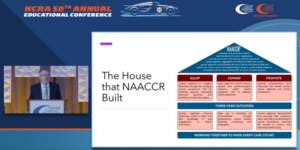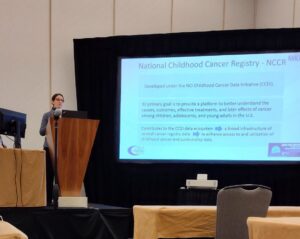
Last April, the National Cancer Registrars Association held its 50th Annual Educational Conference, in Indianapolis, Indiana, with the goal to discuss critical cancer registry topics and help registrars stay current.
NAACCR was represented at the Exhibit Hall and was part of the educational sessions.
Angela Costantini (co-chair of the NAACCR Pediatric SSDI WG) provided an enthusiastic presentation titled: “The Trajectory of Pediatric Cancer Data Collection in the United States”. Her presentation highlighted the hard work that standard setters have been performing to figure out how to start collecting pediatric data, especially staging data. She discussed Toronto Staging, the NCCR (National Childhood Cancer Registry), and the brilliant work the Pediatric SSDI WG has been doing, such as the creation of the Pediatric Manual and Abstracting Guidelines (in progress).
Jim Hofferkamp performed an excellent job, as usual, as the moderator for the session titled “It Takes a Village: How Standard Setters Work Together to Answer Your Challenging Questions?”. This session gathered representatives from organizations that provide and/or set standards for collecting data on cancer patients in the United States: NAACCR, NCI SEER, CDC, AJCC, and NCBD. Besides presenting the background of each organization, it was also discussed how the organizations work together to achieve common goals and unite strengths to address challenges that are part of data collection.
Another important presentation performed by Jim Hofferkamp was the keynote panel “Where Are We Now – Updates from National Partners”. Presenters from NAACCR, American Cancer Society, NCI SSER, and CDC shared information about strategic directions their organizations are taking and what it is the impact on the cancer registry profession.
I presented, during a concurrent session, my data quality work with the National Childhood Cancer Registry (NCCR): “Comparing Data Completeness Between Pediatric and Adult Cancer Cases for NCCR Participating Registries”.
During this session I was able to summarize the NCCR effort and the work that each working group is performing. One of the Data Quality WG projects is to compare completeness between pediatric and adult cases. The method used was the MMOT (Median/Multiple Outlier Testing Method) a quality control tool recently developed by the National Cancer Institute’s Surveillance Research Program. The data items selected for this presentation were race and treatment status. Results confirmed that adults present higher completeness than children, despite the year of diagnosis or type of registry funding. More results will be presented at the NAACCR Conference in Boise <hyperlink> in June. Stay tuned!
What to Read Next
Looking Ahead: Changes Approved for 2025 Registry Data Standards
The High-Level Strategic Group (HLSG) voted earlier this month to approve changes to the NAACCR Data Standards and Data Dictionary…
Happy National Cancer Registrar’s Week
Happy National Cancer Registrars Week! On behalf of the NAACCR Board of Directors, I want to take this opportunity to…
CROS Task Force SEEKS Canadian Representatives
In the 2022 Fall edition of the NAACCR Narrative, we shared exciting news about a project aimed at reviewing and…








